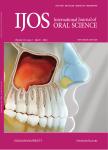Genomic alterations in oral multiple primary cancers
作者机构:Hebei Key Laboratory of StomatologyHebei Clinical Research Center for Oral DiseasesHebei Medical UniversityShijiazhuangChina Department of OrthodonticsSchool and Hospital of StomatologyHebei Medical UniversityShijiazhuangChina State Key Laboratory of Oral Diseases&National Center for Stomatology&National Clinical Research Center for Oral Diseases&West China Hospital of StomatologySichuan UniversityChengduChina Department of Preventive DentistrySchool and Hospital of StomatologyHebei Medical UniversityShijiazhuangHebeiChina
出 版 物:《International Journal of Oral Science》 (国际口腔科学杂志(英文版))
年 卷 期:2024年第16卷第1期
页 面:145-153页
核心收录:
学科分类:1002[医学-临床医学] 100214[医学-肿瘤学] 10[医学]
基 金:supported by the National Nature Science Foundation of China (China, grant numbers 81671006, 81300894) CAMS Innovation Fund for Medical Sciences (China, grant number 2019-I2M-5-038) National Clinical Key Discipline Construction Project (China, PKUSSNKP-202102)
主 题:alterations metastasis oral
摘 要:Oral squamous cell carcinoma (OSCC) is the predominant type of oral cancer, while some patients may develop oral multiple primary cancers (MPCs) with unclear etiology. This study aimed to investigate the clinicopathological characteristics and genomic alterations of oral MPCs. Clinicopathological data from patients with oral single primary carcinoma (SPC, n=202) and oral MPCs (n=34) were collected and compared. Copy number alteration (CNA) analysis was conducted to identify chromosomal-instability differences among oral MPCs, recurrent OSCC cases, and OSCC patients with lymph node metastasis. Whole-exome sequencing was employed to identify potential unique gene mutations in oral MPCs patients. Additionally, CNA and phylogenetic tree analyses were used to gain preliminary insights into the molecular characteristics of different primary tumors within individual patients. Our findings revealed that, in contrast to oral SPC, females predominated the oral MPCs (70.59%), while smoking and alcohol use were not frequent in ***, long-term survival outcomes were poorer in oral MPCs. From a CNA perspective, no significant differences were observed between oral MPCs patients and those with recurrence and lymph node metastasis. In addition to commonly mutated genes such as CASP8, TP53 and MUC16, in oral MPCs we also detected relatively rare mutations, such as HS3ST6 and RFPL4A. Furthermore, this study also demonstrated that most MPCs patients exhibited similarities in certain genomic regions within individuals, and distinct differences of the similarity degree were observed between synchronous and metachronous oral MPCs.



